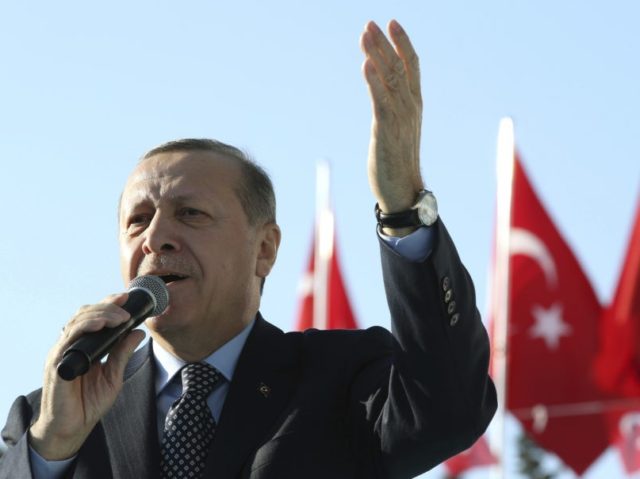This morning’s key headlines from GenerationalDynamics.com
- Furious Turkey threatens migrant deal over Greece’s failure to extradite
- Desperate EU officials still try to shut down Mediterranean migration route
Furious Turkey threatens migrant deal over Greece’s failure to extradite

Turkish soldiers after landing in Greece on July 17 of last year (Reuters)
Greece’s Supreme Court on Thursday blocked the extradition of eight Turkish military officers sought by Ankara over the failed coup of July 15 of last year.
On July 16, the day after the coup attempt, a Turkish military helicopter landed unexpectedly in the Greek town of Alexandroupoli, close to the Turkish border. Eight Turkish soldiers emerged from the helicopter, asking for political asylum.
Turkey said that the eight soldiers were traitors, and demanded their extradition.
It has been six months since then, and the asylum request is still pending. However, on Friday, Greece’s Supreme Court ruled against extraditing them back to Turkey. The court said that there was on evidence that they were involved in the coup attempt, and that they were unlikely to get a fair trial in Turkey. The soldiers claim that they would be killed if they returned to Turkey.
Turkey, on the other hand, claims that they provided documents and other evidence that proves that the eight soldiers were involved, and that Greece’s refusal to extradite is a violation of international law.
Turkish officials are furious:
We will carry out a comprehensive evaluation of the impact of this decision – which we believe has been taken with a political motive – on our bilateral ties, co-operation in the fight against terrorism and on other bilateral and regional issues…
There is a migration deal we signed, including a readmission deal with Greece, and we are evaluating what we can do, including the cancellation of the readmission deal with Greece.
The readmission deal is one part of the EU-Turkey migrant deal signed last year. Turkey agreed with the EU to take back all migrants and refugees who cross to Greece illegally. In return, Turkey would receive financial aid, visa-free travel for all Turkish citizens in Europe, and an acceleration of negotiations for Turkey to join the EU. Turkey and Greece also have an agreement on the readmission to Turkey of illegal migrants.
The EU-Turkey deal has been extremely successful, in that it’s reduced the flow of migrants from Syria and Iraq into the EU from a torrent into a trickle. The EU so far has refused to grant visa-free travel to Turkish citizens, or to accelerate negotiations for Turkey to join the EU.
Turkey has sometimes threated the “nuclear option” of cancelling the entire deal. However, on this occasion, the threat appears to be far less substantial – just canceling the portion of the deal that permits Greece to send refugees back to Turkey for readmission.
The EU is trying to play a balancing act with Turkey. The EU desperately needs the migrant deal, since another influx of hundreds of thousands of migrants would threaten the cohesion of the EU itself. On the other hand, Turkish authorities have fired or jailed hundreds of thousands of people since July, accusing them of supporting the coup, while not supplying any evidence. These arrests have particularly targeted journalists, teachers and police officers. These massive firings and jailings have caused astonishment among EU officials, raising human rights concerns to the point where visa-free travel and EU membership are strongly rejected by many EU officials. Hurriyet (Ankara) and Greek Reporter and BBC (19-Jul-2016)
Related Articles
- EU’s expected scathing report on Turkey may scuttle refugee deal (09-Nov-2016)
- Turkey’s Erdogan blames the EU for reneging on the refugee deal (23-Sep-2016)
Desperate EU officials still try to shut down Mediterranean migration route
Even if the EU-Turkey migrant deal remains intact, there could still be hundreds of thousands of migrants traveling from Libya to Italy by crossing the Mediterranean. The technique used by human smugglers is to pack 40 migrants in a rubber dinghy that’s supposed to hold no more than 10 people, and send them out to sea off the coast of Libya. They’re told to call the Italian coast guard once they’re in international waters and ask to be saved.
Because of the instability in Libya, it’s clear that there’s no hope of an EU-Libya deal as effective as the EU-Turkey deal.
Instead, EU officials are moving ahead with a plan to establish refugee camps in Africa. When migrants are picked up from dinghies in the Mediterranean, they’ll be taken to these African refugee camps rather than to Europe.
According to Germany’s Interior Minister Thomas de Maizière, “The people taken up by the smugglers need to be saved and brought to a safe place. But then from this safe place outside Europe, we would bring into Europe only those who require protection.” RFE/RL and Russia Today and Reuters
Related Articles
- Mediterranean migrant traffic to Italy and Greece continues, despite cold weather (01-Dec-2016)
- In a new catastrophe, hundreds of migrants drown in the Mediterranean Sea (19-Apr-2016)
KEYS: Generational Dynamics, Turkey, Greece, Alexandroupoli, Libya, Italy, Mediterranean Sea, Thomas de Maiziere
Permanent web link to this article
Receive daily World View columns by e-mail

COMMENTS
Please let us know if you're having issues with commenting.